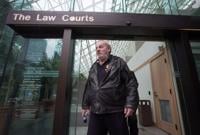VANCOUVER - Five women who were raped in their Vancouver homes in the early 1980s all believed it was the same perpetrator, a man named Ivan Henry who was sent to prison indefinitely in 1983.Â
He was let out after 27 years, acquitted of the crimes and later paid $8 million due to his wrongful conviction, but the decades-long ordeal was far from over following his highly-publicized release.
The women are now in their 60s and 70s, and their lawyers say their clients are grateful their voices have been heard by the justice system after suing Henry for sexual assault and winning $375,000 each in a B.C. Supreme Court civil lawsuit.Â
The B.C. Supreme Court's ruling released this week is the culmination of more than 40 years of legal wrangling, much of that time leaving the victim's "voiceless" as Henry was portrayed publicly as a victim of state misconduct, rather than a man behind a string of rapes, their lawyers Irina Kordic and Kevin Gourlay say in a statement released Thursday.Â
The court's decision confirms "what these five remarkably brave women have said for over four decades: Ivan Henry was the man who sexually assaulted each of them," the statement says.Â
"The legal process has been a long and arduous journey," it says.Â
The plaintiffs have lived "remarkable lives" in the years since, but felt they'd been left "voiceless" after Henry was released, and a public narrative emerged that he was an "innocent man."Â
Justice Miriam Gropper of the B.C. Supreme Court found Henry liable for their sexual assaults on a balance of probabilities, a civil court's standard that's contrasted with a criminal court's standard of proof beyond a reasonable doubt.Â
The judge found that Henry should not have been imprisoned indefinitely as a dangerous offender, but found he was more likely than not to be the perpetrator in the plaintiffs' assaults.Â
"Henry is not a credible witness. I do not accept his denials over the plaintiffs’ evidence," the judge wrote.Â
The statement from their lawyers details how the women were questioned by Henry himself during his trial since he went to court without a lawyer.Â
The statement says public scrutiny focused on violations of Henry's rights, during a special prosecutor's review, his appeal of the conviction and later in the multimillion-dollar lawsuit after he sued the City of Vancouver and the B.C. and federal governments.Â
"Through all of this, the rights of the women he sexually assaulted were not considered," the statement from law firm Murphy Battista said. "They were not called upon or allowed to participate in the process."Â
It said the women now hope the legal system will not just focus on offenders' rights in cases of wrongful convictions, while denying victims support during some of the "worst moments of one's life."Â
"Victims should not be left to fight for themselves," the statement said.Â
Emma Cunliffe, a law professor at the University of British Columbia, has been following the Henry case for many years.Â
She said the victims were "shut out" as Henry pursued damages for his wrongful conviction, and their civil legal victory reflects that a wrongful conviction doesn't necessarily equal innocence.Â
"We can exonerate or acquit somebody in the circumstances where we have a reasonable doubt about their guilt, including on the basis that there's been state misconduct," she said. "Factual innocence is not necessarily the standard by which we identify wrongful convictions, and we do need to be careful in how we talk about these cases."
Cunliffe said the legal system lacks a "holistic" approach, that in Henry's case saw the victims unable to meaningfully participate as he pursued damages for his wrongful conviction.Â
"The plaintiffs tried in a number of ways to ensure that their experiences and their voices were included in the process of understanding the harms of this wrongful conviction and they were excluded by the legal system at every turn," she said.Â
Cunliffe said the Supreme Court of Canada denied the victims' bid to intervene in Henry's case, a topic she tackled in a 2017 article exploring the problematic "loss of the victims' voices from the wrongful conviction process."Â
She said criminal law is an "adversarial system" that isn't capable of tackling cases where it could be true that victims were harmed at the same time a perpetrator was mistreated.Â
"We lose an understanding of the harms of the system if we focus on one of those problems to the exclusion of the other," she said.Â
This report by ºÚÁϳԹÏÍø was first published Feb. 6, 2025.Â







































